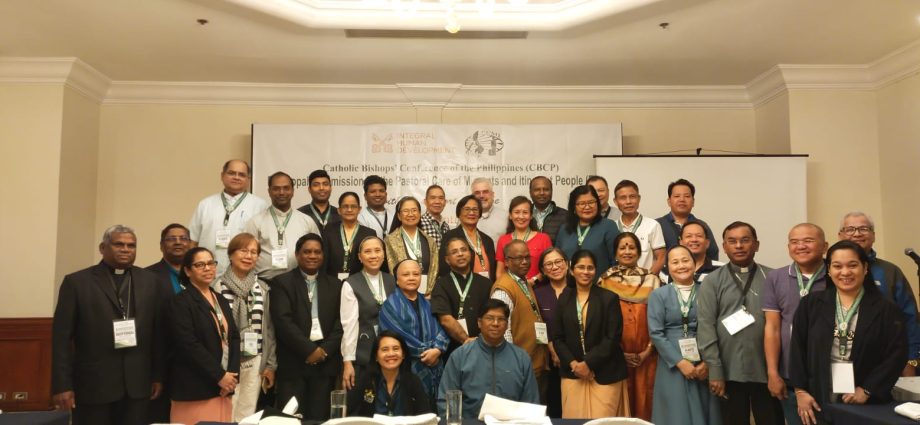By Rani Punnasseril
Manila, Feb 19, 2024: As many as 54 people, including 22 from India, working among migrants in Asia were given special training to attend to migrants in the subcontinent.
The February 12-17 program in the Philippines capital of Manila was organized by the Vatican Dicastery for Integrated Human Development and Commission for Migrants in collaboration with the commissions for migrants under the Philippine bishops’ conference and Conference of Catholic Bishops of India (CCBI).
The training, named Exodus formation seminars, covers topics such as the challenge of religious diversity in migration and understanding of migration in Asia, studies migration mentioned in the Bible, the theology of migration and the Church’s teaching on migration.
The participants also study the history of pastoral care of migration, laity’s role in helping migrants, pastoral care of seafarers and fishermen, advocacy and networking on migration and the human rights of migrants.
Workshops in the training give the participants a platform to share their experiences and prepare them to plan the migration ministry in their dioceses.
The program also provides a forum for educating people, encouraging compassionate action, and developing discourse. The participants also had exposure programs to help them understand migrants’ experiences.
It was created in 2001 by the Scalabrini Migration Centre, a research organization dedicated to the study of international migration and the promotion of understanding the multi-faceted dimensions of migration in the Asia-Pacific region.
It has so far held 11 training programs for more than 500 migrant pastoral workers.
Since 2009, the Philippine bishops’ Commission for the Pastoral Care of Migrants and Itinerant People has been tasked with implementing the Exodus program.
The pandemic disrupted the training and the last one- tenth in the series — was held in 2019.
On the first day of the latest program, Monsignor Fabio Baggio, undersecretary to the Vatican dicastery, asserted, “Everyone has the freedom to leave their homeland and the freedom to choose their destination in this world.”
Monsignor Baggio highlighted the importance of respecting the dignity and rights of migrants, regardless of their status or background.
Christine Nathan, president of the International Catholic Migration Commission and a consultant of the International Labour Organization, recalled that the recent United Nations conference on migration has called for a comprehensive policy on immigration. She stressed protecting the rights and dignity of migrant workers, regardless of their status or nationality.
She praised the organizers for bringing together stakeholders within the Church and beyond to address the challenges faced by migrant workers globally. She called for increased collaboration between governments, civil society, and international organizations to create policies that prioritize the well-being of migrants.
Nathan stressed the need for concrete action and implementation of policies to ensure the rights of migrant workers are upheld.
Archbishop Victor Henry Thakur of Raipur, the chairman of the CCBI Commission for Migrants, stressed the need to show love, respect, and acceptance to migrants.
Archbishop Peter Machado of Bangalore, chairman of the Karnataka Regional Bishops’ Council, highlighted the vital contributions made by migrant labourers.
“They really enhance our lives. Bangalore saw a noteworthy standstill during the difficult COVID-19 Pandemic since migrant laborers were not present.” As a result, businesses and organizations were forced to airlift workers from their countries of origin, he added.
Father Stephen Alathara, CCBI deputy secretary general, stressed the urgency of integrating the Catholic Church’s teachings on social justice into daily life. He asserted that those teachings have a great role in addressing systemic issues such as poverty, inequality, and discrimination.
Father Jesudass Rayappan fromTamil Nadu said the training provided him insights into the challenges faced by migrants, refugees, internally displaced persons, and stateless people. He promised to work tirelessly to support the commission and its goals.
CCBI executive secretary Father Jaison Vadassery, said he was eager to provide his team the Manila exposure where they could learn the Philippine Church’s excellent policies for its migrants.
He said the commission’s regions would now work with other organizations to educate people to embrace those from all backgrounds.
The commission also plans to interact with decision-makers and public servants to advocate for more comprehensive laws that safeguard migrant workers’ rights and ensure their equitable treatment at work.
India, which has many interstate migrants, has its citizens spread in different parts of the world. The CCBI established the Commission for Migrants in 2019 after it realized the need for providing special care for such people, Father Vadassery explained.










